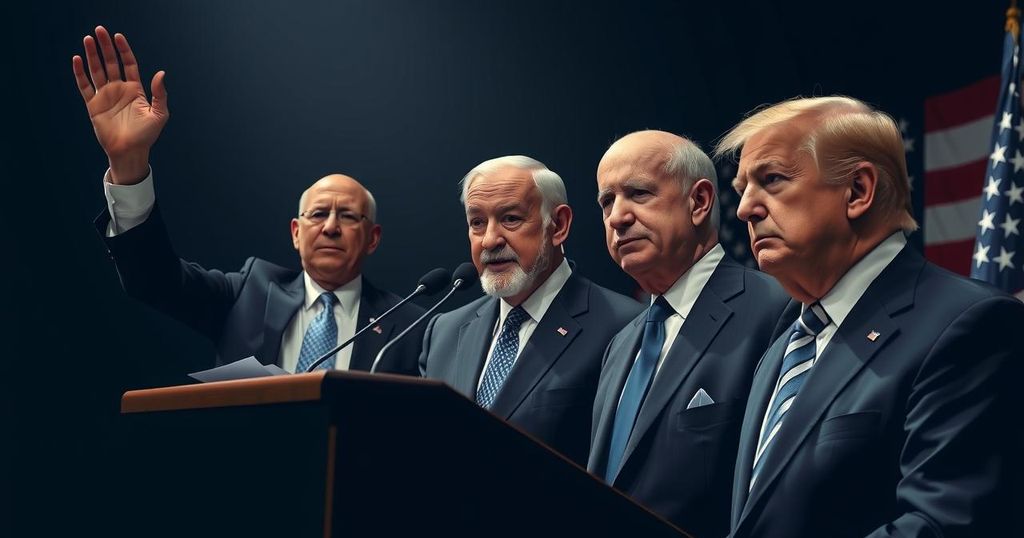Conservative Christians Navigate Complex Loyalties in Support of Trump and Israel

In the lead-up to the US general election, Donald Trump and his allies focus on conservative Christians to consolidate support. Events like “Believers for Trump” address concerns regarding Trump’s morality and the party’s stance on issues like unconditional Israel support amidst the Israeli-Palestinian conflict. While a majority of evangelical voters traditionally support Israel, growing dissent regarding military aid and the impact of international policies reflects changing sentiments within this demographic.
In the crucial closing phase of the United States general election, former President Donald Trump and his associates are actively engaging conservative Christian voters to solidify support for the Republican Party. Events titled “Believers for Trump” and “Believers and Ballots” are being held nationwide, where Republican officials aim to address lingering concerns regarding Trump’s moral character that persist from his 2016 campaign and onward. Notably, there is anxiety among conservative Christian voters about Trump’s shifting stance on issues such as abortion and the increasing focus on unconditional support for Israel amidst the ongoing conflict in the Middle East. Michael Whatley, the chair of the Republican National Committee, assured attendees at a rally in Austell, Georgia, that the party remains staunchly pro-life, pro-family, and pro-Israel. However, many at the event expressed discomfort with the current Republican emphasis on unconditional support for Israel, particularly given the humanitarian crisis in Gaza, where thousands of Palestinians have lost their lives. Cindye Coates, a pastor, criticized the notion of unwavering support for Israel, questioning how such a stance aligns with the “America First” philosophy championed by Trump. Her husband, Stan Coates, echoed her sentiments, noting the need to refocus on pressing issues within the United States rather than overseas aid. Surveys indicate a significant portion of conservative Christian voters maintains a complex relationship with Israel, supporting both strong ties and a desire for some limitations on aid. Data shows that while many white evangelical Protestants view Israel favorably, a growing minority believes that the emphasis on Israel may conflict with their priorities as Americans. Recent polling highlights that nearly one-third of white evangelicals advocate for restrictions on military assistance to Israel. Trump has consistently positioned himself as a defender of Israel, promoting initiatives such as the recognition of Jerusalem as Israel’s capital. However, the extent to which this aligns with the sentiments of conservative voters remains uncertain. Within the evangelical community, divisions are evident, with some leaders advocating for traditional political alignment with Israel while others recognize the distress faced by Palestinians. Prominent figures, including Ralph Reed of the Faith and Freedom Coalition, have called for turnouts of evangelical supporters, reinforcing the narrative of political loyalty to Israel. Ultimately, the relationship between conservative Christian values and Republican policy regarding Israel appears to be evolving, highlighting a tension between faith and political allegiance in the context of contemporary geopolitical realities.
The article explores the intersection of conservative Christian support for Republican candidates, notably Donald Trump, during the lead-up to the United States general election. It addresses the critical role this demographic plays in shaping electoral outcomes, particularly in swing states like Georgia, where discussions around Israel, abortion, and social issues remain pivotal. The political landscape is further complicated by ongoing global conflicts, especially the one between Israel and Palestine, prompting various responses from conservative Christian voters.
The dynamics highlighted in the article illustrate the complexities of conservative Christian support for Trump and the Republican Party in the context of current national and international challenges. While Trump’s established connections to Israel resonate with many conservative Christians, there is an emerging conversation among this group about the implications of unwavering support for Israel, suggesting potential shifts in voter sentiment. As the election approaches, the relationship between evangelical values and political choices will likely continue to be a significant factor in shaping the electoral landscape.
Original Source: www.aljazeera.com






